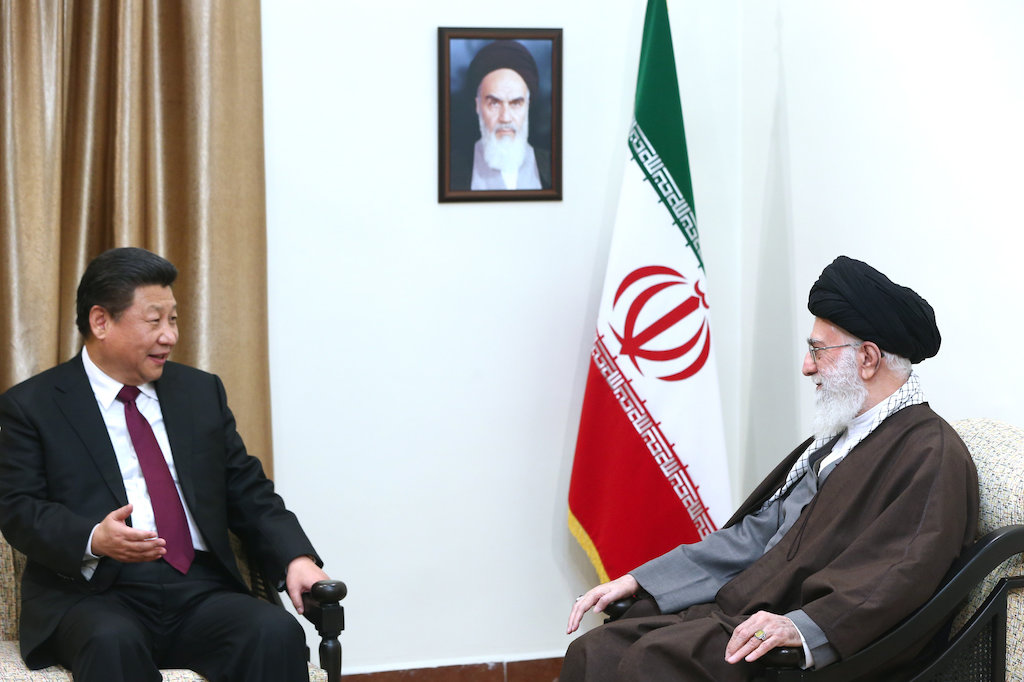Iran and China vs the US?
June 4, 2019 | Expert Insights

Background
Diplomatic ties between Iran and China were first established in 1971. China maintained its relationship with Iran following the 1979 Iranian revolution. Since the 1979 revolution, China has become an essential economic and military partner for Iran.
Persia was a crucial stop on China's historic Silk Road trade route, with commerce existing between the two regions for Millenia. Today, China is one of Iran's main trade partners, accounting for approximately 22.3% of total trade. Trade between Iran and China has more than doubled since 2006. In 2017 alone, their two-way trade increased by 21%. According to some estimates, China buys around 10% of its oil from Iran, with the country being the largest importer of Iranian crude.
Following President Trump's withdrawal from the 2015 Iran nuclear deal, the Joint Comprehensive Plan of Action (JCPOA), the US stopped issuing waivers that permit purchases of Iranian crude. China, one of the signatories of the JCPOA, has to stop buying Iranian oil or face US sanctions as a result of the policy. China is also engaged in a trade war with the US.
Analysis
Iranian Foreign Minister Mohammad Javad Zarif recently visited Beijing. Mr Zarif called upon China to help the JCPOA by taking "practical steps" to save the nuclear accord. Mr Zarif said that China must lead the way for the world to normalise economic relations with Iran. Mr Zarif was received by Chinese Foreign Minister Wang Yi, who reiterated Beijing's support for the JCPOA. Mr Yi told Mr Zarif that China would work with Tehran to "rule out the disruptions of certain complications" to completely implement the JCPOA.
Iran is currently facing a dilemma - it can either adhere to US demands, stopping all uranium enrichment, or it can abandon certain clauses under the JCPOA. The latter option is likely to result in pushback from European signatories. The implementation of US sanctions against Iran and various sections of the Islamic regime has severely weakened the country's economic position. Many Iranian allies purchased crude oil from Tehran under the waiver scheme implemented by the US. The termination of this program has worsened Iran's economic forecast.
China has not committed to halting imports from Iran despite the threat of US sanctions after the termination of the waiver program. Instead, Chinese officials have repeatedly stated that they believe in continuing the implementation of the JCPOA. Just as Mr Zarif met Mr Yi in Beijing, a Chinese tanker named Pacific Bravo left the Persian Gulf with approximately 2 million barrels of Iranian oil. Pacific Bravo is the first major tanker to carry Iranian crude after the waiver program ceased and is expected to be heading to China, according to TankerTrackers.com. Another vessel, the Marshall Z, which previous reports showed to be involved in helping Iran circumvent sanctions, docked in the Chinese port of Zhoushan according to Refinitiv Eikon.
China is also facing a dilemma over Iran. As relations over trade and strategic affairs with the US deteriorate, China is in a tough position. China's dependence on external sources of oil, especially from the Middle East, does not allow for concrete measures to safeguard its energy security. Chinese crude imports climbed to record highs before the waiver program expired. Chinese importers had stocked up on Iranian oil before the sanctions exemptions expired.
Some analysts believe that Beijing may counter the threat of US sanctions by using the Yuan or the Euro as the payment currency to deal with Iran. Most oil transactions today are made in US dollars, considering its purchasing power. The US wants to drain Iran of its dollar holdings to reduce the effectiveness of its global purchases. Because the Yuan and Euro are other currencies with global value, China can conduct trade in with the Yuan, should Iran be willing to accept it as payment.
The US, under President Trump, has been willing to use sanctions even if it might hurt its economy. The US is likely to implement sanctions against China if they continue to purchase Iranian oil through any mechanism.
Counterpoint
China has consistently sought to restrict its involvement in the Middle East to economic matters. If China and Iran were to deepen their economic cooperation by circumventing US sanctions on Iranian crude, it is likely to result in China becoming more involved in the Middle East. An expert on the Middle East at China's Yunnan University said, "It has never been China's intention or interest to become too involved in the Middle East."
China's treatment of Muslim-majority Uyghurs may prove to be a stumbling block in relations with the Islamic regime in Tehran, although their current geo-economic condition leads Iranian leaders to ignore these allegations.
Assessment
Our assessment is that China and Iran are likely to grow closer as they find themselves facing a common foe. For both parties, this is a mutually beneficial exercise; China can secure its energy, while Iran can sell its oil, thereby boosting its economy. This is likely to result in China seeking a way to circumvent US sanctions by using the Yuan or the Euro to settle trade deals. Should greater engagement be explored, we estimate that Iran will link to Pakistan's Gwadar Port, which is Chinese controlled, carrying oil through the China-Pakistan Economic Corridor into China's interior. We believe that China's reluctance to involve itself in Middle Eastern affairs is likely to dissuade the country from cooperating with Iran beyond economic matters.
Image Courtesy - Official website of Ali Khamenei, Supreme Leader of Iran [CC BY 4.0 (https://creativecommons.org/licenses/by/4.0)]








Comments